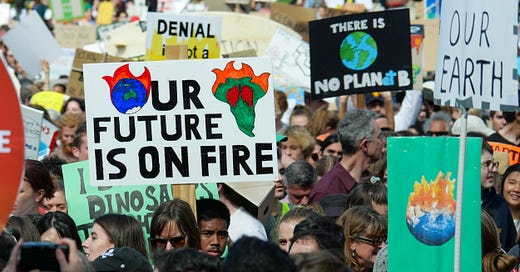Protect my child from climate change, you cretins
Maintaining a safe planet and halting global warming - a truly global intergenerational crisis - will require countries like Australia to properly recognise the rights of future generations.

For the last few years I’ve been undertaking a law degree at the University of Technology Sydney part-time (I’m almost finished), and as part of these studies I had the opportunity to spend a semester writing a research paper on a topic of my own design.
Surprise, surprise. I wrote the paper on climate change litigation.
Instances of climate change litigation have exploded over the last decade as the urgency of the climate crisis becomes growingly evident and advocates turn to the law as a means of limiting or preventing the development of new sources of fossil fuels.
The Grantham Research Institute on Climate Change and the Environment Worldwide, estimates that between 2020 and 2015, the number of climate change-related cases more than doubled. Australia was host to the second highest number of cases involving climate litigation, only surpassed by the United States.
I don’t think this statistic is particularly surprising - it involves two countries that have contributed a lot to the causes of climate change and are both home to governments and corporations who have shown an utter unwillingness to take the climate crisis seriously.
I’ve been sitting on this newsletter for a few weeks as I awaited my marks for the paper. Fortunately, for us both, I received a good enough mark that I feel sufficiently confident to email it to about 150 people.
So, I offer you, my loyal readers, a link to my paper titled:
My research was a deep dive into the decision of the full federal court in Minister for the Environment v Sharma - the case brought by a group of school students who sought a declaration from the court that the federal environment minister had a duty of care to protect them from the harms of climate change.
A declaration that a duty of care exists would be an early step towards establishing a tort of negligence. If someone owes you a duty of care, they breach that duty and you suffer a harm as a result - then you can seek compensation for that harm (that’s the basic concept, but negligence law is a bit more complicated in practice).
I also look at the Environment Protection and Biodiversity Conservation Act (EPBC Act), the primary piece of federal environment legislation that gives the federal environment minister powers to approve or reject new fossil fuel projects.
It was timely to consider the mechanics of Australia’s federal environment laws, following the election of a new government that talked up its climate change credentials while also baulking at commitments to stop new coal and gas projects.
As has been made abundantly clear - by the International Energy Agency no less - the development of new coal and gas projects is incompatible with keeping global warming to below 1.5 degrees.
Hopefully, the research paper will provide a good background of the legal issues that relate to decisions under the EPBC Act - which have become highly relevant with the current environment minister, Tanya Plibersek, set to make a significant number of approval decisions on new coal and gas projects.
But the current design of the EPBC Act gives virtually zero consideration to the impacts of climate change as a relevant concern.
Hence my main conclusions: Australian law on negligence and the EPBC Act are both ill-equipped to deal with a challenge as broad and as complex as climate change. But there are some clear ways we can fix that.
As an example of what might be possible, the Welsh Parliament (known as the Senedd) passed the Well-being of Future Generations (Wales) Act which requires all Welsh ministers to ensure they are upholding the ‘sustainable development principle’ when exercising their respective powers.
Quite the contrast to the Australian context - while the Australian Government went to court to prevent a declaration that it owed a duty of care to young people and future generations, the Welsh parliament enshrined one into law.
Let me know what you think of the paper - I’m keen to start a conversation about ‘what’s next’ for climate change law reform, now that net zero targets and reforms to the Safeguard Mechanism have been legislated.
Before I go:
Apologies for the length of time between newsletters, there’s been a lot going on.
Not the least, my partner and I have just had our first child. This is the main cause for delay between newsletters and potentially for delays in future posts (sorry folks, I love you all, but this Substack ranks about sixth amongst current life priorities).
I didn’t really appreciate the significance of researching the idea that perhaps we owe future generations a duty to protect them from climate change - at the same time as my partner was literally growing a member of a future generation - but it hit pretty hard by the time I had finished it.
I know it’s super clichéd to be the new parent who suddenly contextualises everything through the frame of having children. But, in my defence, I was already deeply angry about government inaction on climate change before our baby was born. I’ve just levelled-up my anger.
Until next time…




